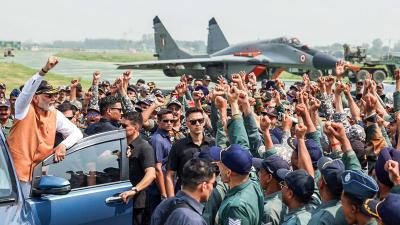US-Iran Nuclear Talks: Tensions Rise Ahead of Key Negotiations
As the US gears up for pivotal nuclear negotiations with Iran, tensions are escalating with mixed signals from both sides. Can diplomacy prevail? Read more to find out!
Tensions are mounting as the United States prepares for crucial nuclear negotiations with Iran, set to take place this Saturday in Oman. A recent meeting in the White House Situation Room, attended by top officials including President Donald Trump, Vice President JD Vance, and Secretary of State Marco Rubio, focused on strategizing the US approach to the upcoming talks. The discussions revolve around potential concessions the US could make or avoid during the negotiations, reflecting a divide within the administration on how best to engage with Tehran.
Internal Divisions on Approach
The meeting revealed stark contrasts in opinion among senior officials. While some, like Vance and Trump's special envoy Steve Witkov, advocate for a diplomatic approach that may require compromises, others, including Rubio and National Security Adviser Mike Walls, lean towards a more aggressive, maximalist strategy. Trump himself has sent mixed messages, indicating a willingness to resolve the nuclear crisis through diplomacy while simultaneously threatening to strike Iran's nuclear facilities if an agreement fails to materialize.
Witkov's statements have also fluctuated, emphasizing that Iran must halt its nuclear enrichment program. This marks a significant shift, as just a day earlier, he suggested that Iran might be allowed to enrich uranium at low levels for energy purposes. This inconsistency raises concerns about the US's reliability in negotiations and complicates the diplomatic landscape.
Iran's Firm Stance and Mistrust
In response to the US's fluctuating positions, Iran's Foreign Minister Abbas Araqchi has made it clear that the right to enrich uranium is non-negotiable. Iran's Supreme Leader Ayatollah Ali Khamenei has expressed a cautious yet supportive stance towards the negotiations, acknowledging a level of mistrust towards the US based on past experiences, notably the US's unilateral withdrawal from the 2015 nuclear deal.
As the talks approach, Araqchi emphasized that while Iran remains open to limiting its nuclear program, it will not concede its right to enrichment or allow unrelated issues, such as regional policies or missile programs, to be part of the discussions. This steadfast position indicates a potential deadlock if the US continues to insist on stringent conditions.
The Role of Russia and Broader Implications
Interestingly, Araqchi's upcoming visit to Moscow ahead of the talks may add another layer of complexity. With Iran and Russia recently signing a comprehensive strategic agreement, there are hopes that Russia could play a constructive role in mediating the discussions. However, Iran's reluctance to move its enriched uranium out of the country poses a challenge, as Tehran fears losing its capabilities should negotiations falter.
The outcome of these negotiations holds significant implications not only for US-Iran relations but also for regional stability in the Middle East. As both sides prepare for the talks, the world watches closely, anticipating whether diplomacy can bridge the widening gap or if the situation will further deteriorate.
Conclusion
As the US and Iran gear up for their crucial meeting, the stakes are higher than ever. With internal divisions within the US administration and Iran's firm stance on its nuclear rights, the road to a new nuclear deal appears fraught with challenges. The upcoming negotiations will test the commitment of both nations to diplomacy in the face of significant distrust and conflicting agendas. The international community remains hopeful for a resolution, but the complexities of the situation suggest that achieving lasting peace will require significant compromise and clarity from both sides.
For continued updates on the US-Iran nuclear talks, stay tuned to our blog for the latest developments.
What's Your Reaction?
















